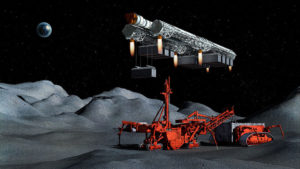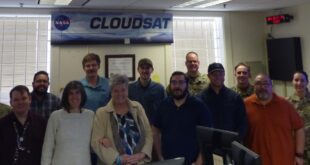
The second contribution to the #SWMEThemes week on the Middle East and Space Resources is by Ben Baseley-Walker, the Senior Director for Global Engagement for Europe, Middle East, and Africa at Planetary Resources. Ben argues that Gulf Arab countries have an opportunity to lead in the coming race to exploit space resources.
Ten years ago, space mining was clearly a topic of space futurists. Today, the reality is quite different. The sector is fast becoming an established business domain and its day-to-day business is tackling the exploration challenges similar to terrestrial mining and extraction companies but operating in new and harsh environments.
The creation of the asteroid mining sector came about from the combination of technological advancement, increasing scientific knowledge, and the significant reduction in cost of building satellites. This opportunity, the same one that has led to the creation of companies like SpaceX, has enabled the private sector to apply existing space technologies to the new problem of asteroid mining.
The tangible benefits of mining resources in space are also similar to the terrestrial extraction process. Space mining for metals and water (and hydrogen and oxygen which is fuel in space) are the main focus of the sector. These materials would be used in space because it is cheaper to extract, process, and bring resources to customers in space rather than launch them from the Earth.
Apart from the near-term goal of potential refueling of the upper stages of rockets and craft carrying long distance missions to Mars and other places in the Solar System, a reliable supply of fuel and metals allows for new industries and activities to take place in way that has never been possible before. Space resources, similar to terrestrial resources such as minerals, oil, and gas, are simply the enabling building blocks in a much more extensive value chain of activities and projects in outer space.
A traditional business sector in a new location
It’s fair to say that space mining does have its fair share of risk – it is still partly space travel after all. However, the risk profile of the extractive process is a familiar one – when examined, as Goldman Sachs recently did, the risk for mining on asteroids looks a lot like risk in terrestrial mining, oil, and gas exploration.
The work of space mining companies is, in terrestrial mining terminology, currently in the exploration phase. Planetary Resources has identified possible target objects or areas for prospecting and are now moving into the phase of in-situ sampling and verification of resources. The confirmation of the quality and extent of the resources will follow – with companies planning exploration missions in the period up to 2020. The risks are familiar; not finding what you hoped, a mine that is not financially viable, or potential equipment failure – all similar to harsh terrestrial mining environments. In short, space miners are simply carrying out old business in a new place.
Who’s getting into space mining?
Whilst this all sounds grounded so far, are we sure space mining isn’t just another technological fad? The evidence would suggest not. Over the last few years, several countries have developed laws and policies surrounding space mining. The U.S. in 2015 and Luxembourg this month passing a space resources law on July 13, 2017. In the Gulf region, the UAE included space mining in its recently released space policy and is actively considering legislation on space mining, along with countries such as Japan, China, and others.
From the financing side, governments and companies are starting to invest. In 2016, the Government of Luxembourg invested in Planetary Resources as part of its strategy to become one of the global hubs for space mining. Luxembourg took a number of strategic steps to create a fertile environment for space mining; appointed a government Special Envoy for Space Resources, attracted several space mining companies, and is exploring the creation of a space fund to support the sector. Through these steps Luxembourg is creating wealth, jobs and setting itself up as a global tech hub for the sector. These are very tangible benefits for the country. Government stakeholders are actively engaging in building strategy and applying strategic investment on space resources issues that create the jobs, capital in-flow, and day-to-day business operations of an innovative extractives centre.
Not for all the tea in China…
As more and more countries and companies continue to become aware of the potential of space mining, faint competition is starting to arise. Like the 18th Century tea trade, countries and companies are starting to consider how they can stay ahead of others in the space resources gold rush. The strategic calculation of getting in on the ground floor of a new extractive sector, that has the potential for medium term jobs and asset realization and long- term wealth generation from space resources production, is resonating with more and more players.
As countries, including the UAE, continue to consider how to position themselves as space resources hubs, the nexus of government support through policy, legislation, and strategic investment is helping the sector to consolidate.
For the Gulf, with its long history in extractive exploration, and the UAE specifically with its track record of investing in strategic sectors, space mining has the potential to be part of an effective diversification strategy that results in capacity-building of tech expertise and attraction of talent to the region.
As with any new technology and exploration – be it rubber, gold, guano, or indeed the internet, the balance of risk and future gain in the early investor stages is a delicate one. Constructive national support and leadership will help alleviate some of these risks while increasing the stake in the reward. The question is; who are going to be the global leaders for space mining? Many players are jockeying for a seat at the table. Building upon a history of resource exploration and investment – it’s high time the Gulf entered the fray.

Ben Baseley-Walker is Planetary Resources’ Director for Global Engagement for Europe, Middle East, and Africa, based in Luxembourg. Ben is also an Associate Fellow at the Geneva Centre for Security Policy where he focuses on emerging security challenges. Prior to these appointments, Ben was the Programme Lead of the Emerging Security Threats Programme (EST) at the United Nations Institute for Disarmament Research (UNIDIR) in Geneva, and before that was the Advisor on Security Policy and International Law for the Secure World Foundation (SWF). He previously worked in international relations and international law in East Africa with the Kenya National Commission on Human Rights, the Ethiopia International Law Project, and the United Nations High Commissioner for Refugees in Nairobi, Kenya. Ben studied International and European Law at the Universiteit Van Amsterdam Law School in the Netherlands, and Politics at the University of Edinburgh in Scotland. He is also a graduate of the International Space University Space Studies Programme in Beijing.
Original published at: https://spacewatch.global/2017/07/swmethemes-space-mining-next-strategic-investment-gulf-countries/
 SpaceWatch.Global An independent perspective on space
SpaceWatch.Global An independent perspective on space

